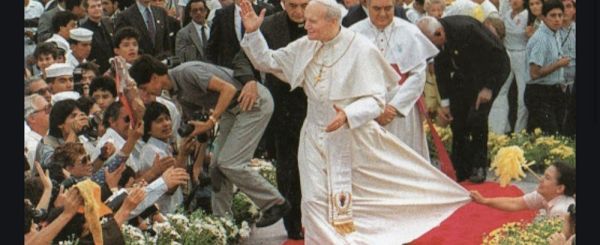2. Looking at Jesus in his passion, we see as in a mirror the sufferings of humanity as well as our own personal vicissitudes. Christ, though sinless, took upon himself what man could not bear: injustice, evil, sin, hatred, suffering and, finally, death. In Christ, the humiliated and suffering Son of Man, God loves all, forgives all and gives ultimate meaning to human existence.
We are here, this morning, to take this message from this Father who loves us. We can ask ourselves: what does he want from us? He wants us, as we look at Jesus, to accept to follow Him in His passion in order to share the resurrection with Him. The words that Jesus said to the disciples come to mind at this moment: "The cup that I drink you will also drink; the baptism that I receive you will also receive" (Mk 10:39); "If anyone wishes to come after me..., let him take up his cross and follow me. For whoever wishes to save his life will lose it; but whoever loses his life for my sake will find it" (Mt 16:24-25).
The 'hosanna' and the 'crucifige' thus become the measure of a way of conceiving life, faith and Christian witness: one must not be discouraged by defeats nor exalted by victories because, as for Christ, the only victory is fidelity to the mission received from the Father. "For this reason God exalted him and gave him the name that is above every other name" (Phil 2:9).
(Pope John Paul II, homily 28 March 1999)
3. St James was the brother of John the Evangelist. They were the two disciples to whom - in one of the most impressive dialogues in the Gospel - Jesus asked that famous question: "Can you drink the cup that I am about to drink? And they answered: 'We can'" (Mt 20:23).
It was the word of willingness, of courage; an attitude typical of young people, but not exclusive to them, but of all Christians, and in particular of those who accept to be apostles of the Gospel. The generous response of the two disciples was accepted by Jesus. He said to them: "My cup you shall drink" (Mt 20:23).
These words were fulfilled in James, son of Zebedee, who by his blood bore witness to the resurrection of Christ in Jerusalem. Jesus had asked the question about the cup that the two brothers were to drink, when their mother, as we read in the Gospel, approached the Master, to ask him for a special place for both of them in the Kingdom. But Christ, having ascertained their willingness to drink the cup, said to them: "My cup you shall drink; but it is not for me to grant that you may sit at my right hand or at my left, but it is for those for whom it has been prepared by my Father" (Mt 20:23).
The dispute over the first place in the future kingdom of Christ, which his disciples imagined as too human, aroused the indignation of the other Apostles. Jesus then took the opportunity to explain to all that the vocation to his Kingdom is not a vocation to power but to service, "just as the Son of Man came not to be served but to serve and to give his life as a ransom for many" (Mt 20:28).
[Pope John Paul II, homily Santiago de Compostela 9 November 1982]












